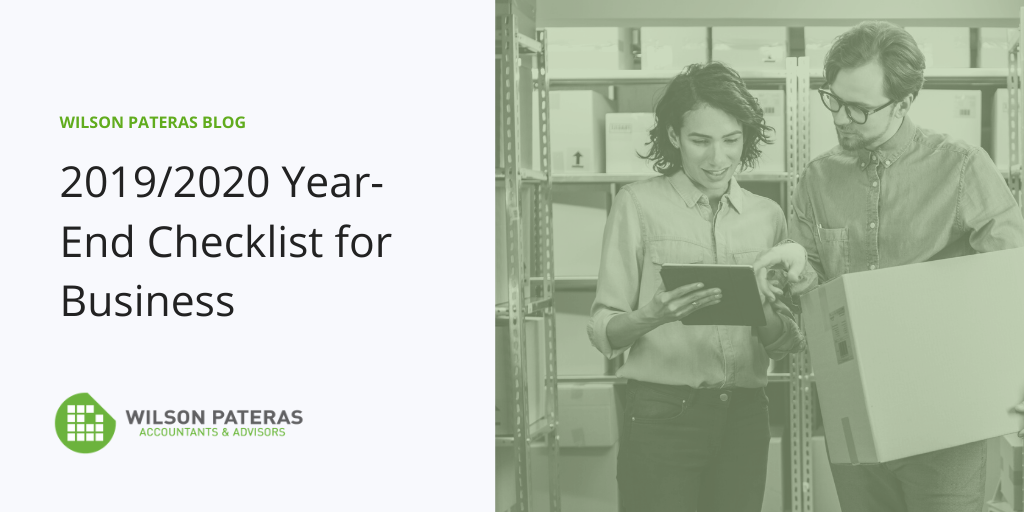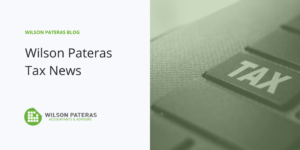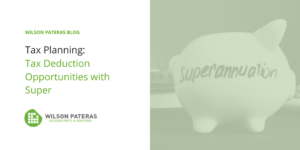
Many of our business clients like to review their tax position at the end of the income year and evaluate any year-end strategies that may be available to legitimately reduce their tax. Traditionally, year-end tax planning for small businesses is based around two simple concepts (i.e., Accelerating business deductions and deferring income). This year, consideration will obviously also need to be given to the impact of the COVID-19 pandemic on specific businesses.
Small Business Entities (‘SBEs’) (i.e., Businesses with an aggregated turnover of less than $10 million) often have greater access to year-end tax planning due to particular concessions that only apply to them. Taxpayers that qualify as an SBE can generally pick and choose which of the concessions they wish to use each year (although see below regarding the simplified depreciation rules). The following are a number of areas that may be considered for all business taxpayers.
Maximising deductions for non-SBE taxpayers
Non-SBE business taxpayers should endeavour to maximise deductions by adopting one or more of the following strategies:
- Prepayment strategies;
- Accelerating expenditure; and
- Accrued expenditure.
Prepayment strategies – non-SBE
Any part of an expense prepayment relating to the period up to 30 June is generally deductible.
In addition, non-SBE taxpayers may generally claim the following prepayments in full:
- expenditure under $1,000;
- expenditure made under a ‘contract of service’ (e.g., salary and wages); or
- expenditure required to be incurred under law.
Note: Prepayments can be a little confusing, so
before you commit to making a payment please feel free to call us with any
queries or assistance if required.
Accelerating expenditure – non-SBE
This is where a business taxpayer brings forward expenditure on regular, on-going deductible items. Business taxpayers are generally entitled to deductions on an ‘incurred basis’. Therefore, there is generally no requirement for the expense to be paid by 30 June 2020 (i.e., as long as the expense has genuinely been ‘incurred’).
Checklist
The following may act as a checklist of possible accelerated expenditure:
- Depreciating assets – Non-SBEs that have an aggregated annual turnover of less than $50 million can claim an immediate deduction for eligible assets costing less than $30,000 for any assets acquired and first used (or installed ready for use) from 7:30pm (AEDT) 2 April 2019 to before 12 March 2020.
Non-SBEs that have an aggregated turnover of less than $500 million can claim an immediate deduction for eligible assets costing less than $150,000 for any assets acquired from 7:30pm (AEDT) on 2 April 2019 and first used (or installed ready for use) from 12 March 2020 to 30 June 2020.
Depreciating assets costing $100 or less can be written off in the year of purchase and depreciating assets costing less than $1,000 can be allocated to a low value pool and depreciated at 18.75% (which is half of the full rate of 37.5%) in their first year, regardless of the date of purchase.
Finally, a 50% accelerated depreciation concession may apply for new eligible assets that start to be held and used (or installed ready for use) from 12 March 2020 to 30 June 2021.
- Repairs.
- Consumables/spare parts.
- Advertising.
- Fringe benefits – any benefits to be provided, such as property benefits, could be purchased and provided prior to 1 July 2020.
- Superannuation – contributions to a complying superannuation fund, to the extent contributions are actually made (i.e., they cannot be accrued but must be paid by 30 June).
Accrued expenditure
Non-SBE taxpayers (and many SBE taxpayers – refer below) are entitled to a deduction for expenses incurred as at 30 June 2020, even if they have not yet been paid.
The following expenses may be accrued:
- Salary or wages and bonuses – the accrued expense for the days that employees have worked but have not been paid as at 30 June 2020.
- Interest – any accrued interest outstanding on a business loan that has not been paid.
- Commissions – where employees or other external parties are owed commission payments.
- Fringe benefits tax (‘FBT’) – if an FBT instalment is due for the June 2020 quarter, for example, but not payable until July, it can be accrued and claimed as a tax deduction in the 2020 income year.
- Directors’ fees – where a company is definitively committed to the payment of a director’s fee as at 30 June 2020, it can be claimed as a tax deduction.
Maximising deductions for SBE taxpayers
Deductions can be maximised for SBE business taxpayers by accelerating expenditure and prepaying deductible business expenses.
Accelerating expenditure – SBE
In addition to accelerating other expenditure items, SBE taxpayers can choose to write-off depreciating assets costing less than $30,000 (or potentially $150,000) in the year of purchase.*
Assets costing more than the relevant immediate asset write-off threshold are allocated to an SBE general pool and depreciated at 15% (or potentially at 57.5% for eligible new assets subject to the 50% accelerated depreciation concession) in their first year. Therefore, where appropriate, SBE business taxpayers should consider purchasing/installing these items by 30 June 2020.
(*) The immediate asset write-off threshold was originally increased to ‘less than $30,000’, for eligible assets first used or installed ready for use between 7:30pm (AEDT) 2 April 2019 and 30 June 2020.
The threshold was subsequently increased to $150,000 for eligible assets first used or installed ready for use from 12 March 2020 to 30 June 2020 as a result of the Government’s response to the COVID-19 pandemic.
Prepayment strategies – SBE
SBE taxpayers making prepayments before 1 July 2020 can choose to claim a full deduction in the year of payment where they cover a period of no more than 12 months (ending before 1 July 2020).
Otherwise, the prepayment rules are the same as for non-SBE taxpayers.
The kinds of expenses that may be prepaid include:
- Rent on business premises or equipment.
- Lease payments on business items such as cars and office equipment.
- Interest – check with your financier to determine if it’s possible to prepay up to 12 months interest in advance.
- Business trips.
- Training courses that run on or after 1 July 2020.
- Business subscriptions.
- Cleaning.
Information Required
This is some of the information we will need you to bring to help us prepare your income tax return:
- Stock-take details as at 30 June 2020.
- Debtors listing (including a list of bad debts written off) as at 30 June 2020.
- Note: In order to claim a deduction, the debt must be written off on or before 30 June.
- Creditors listing as at 30 June 2020.
Please contact us on 03 8419 9800 if you need assistance or would like to book in a meeting.
This article contains general advice only. It does not take into account your or your business objectives, financial situation or needs. You should seek advice from a financial planner, accountant or other professional adviser before making any financial decision based on this information. Liability limited by a scheme approved under Professional Standards Legislation, other than for the acts or omissions of financial services licensees.





